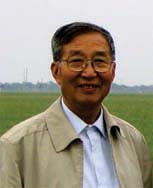
Prof. Li Zhensheng, a geneticist and an expert on wheat breeding from the CAS Institute of Genetics and Developmental Biology, was born in Zibo City, Shandong Province in February 1931. He graduated from Shandong Agricultural College in 1951, and was elected as a fellow of the Academy of Sciences for the Developing World in 1990 and a CAS member in 1991.
1. Breeding a series of new cultivars, named
Xiaoyan, via intergenous crosses between common wheat (
Triticum aestivum) with the wheatgrass (
Agropyron elongatum= Thinopyrum elongatum, 2n = 70).
In the early 1950s, the stripe rust, a fungi disease of wheat, caused serious epidemic in the winter wheat crop in northern China, leading to heavy yield losses. To identify new resistance sources, Prof. Li carried out systematic studies of the intergenous hybridization between wheat and wheatgrass by overcoming three stumbling blocks: low compatibility during crossing, poor hybrid fertility and wide segregation of hybrid offsprings. He succeeded in transferring the genome, chromosomes and chromosomal segments of wheatgrass into common wheat, and developed many new valuable cytogenetic lines and varieties, including octoploids, alien-addition lines, alien-substitution lines, translocation lines and three commercial varieties (
Xiaoyan-4, Xiaoyan-5 and Xiaoyan-6) that were featured with high yielding, stripe rust-resistant and good quality. The wheat cultivars developed by Prof. Li have been widely and extensively cultivated in China, including a dozen of provinces and autonomous regions, and has brought massive socio-economic returns, which has set a successful example in the development and utilization of wheat varieties by intergenous hybridization between common wheat and its wild relatives.
2. Development of a new wheat chromosome engineering system.
In order to improve the accuracy and efficiency in transferring the genes from wild germplasms into common wheat, Prof. Li developed a new blue-grained wheat monosomic (BGM) system and fertile nullisomic lines using blue endosperm gene(s) from Agropyron as genetic marker. The monosomic chromosomes in these lines were each engineered to contain a translocated wheatgrass chromosomal segment, which possesses the gene(s) producing a blue pigment in the seeds. In hybridization using the blue-grained monosomic lines, the genomic compositions (i.e., chromosomal number, integrity of the monosomic chromosome) could be visually judged in the field by examining the blue pigmentation in the seeds, thus reducing the labor examinations of the individual progenies by microscopy. Using the nullisomic lines derived from the blue-grained monosomic wheats, Prof. Li established the nullisomic backcross method, a novel wheat chromosome engineering approach, for efficient generation of new substitution lines, which could be further bred into new commercial varieties.
3. Pioneering a new direction in breeding wheat varieties with high nutrient efficiency.
In consideration of China's need to feed a huge population with inadequate farmland and limited mineral resources, Prof. Li advocated and pioneered a new direction in wheat breeding, e.g., development of mineral nutrient efficient wheat varieties, in the early 1990s. To this end, he discovered phosphorus (P) and nitrogen (N) efficient wheat germplasms, and studied the mechanisms underlying the high P and N efficiencies of these materials. As a result, he bred two new wheat varieties
Xiaoyan-54 and Xiaoyan-81, which are highly efficient in utilizing soil P and N nutrients. Based on the success in nutrient efficiency breeding, Prof. Li has proposed a set of new guidelines for crop breeding research in China, the essence of which is: obtaining more output of yield with less input of natural resources, promoting the protection of environment and sustainable development of agriculture.
In addition to the academic achievements listed above, Prof. Li has made many important and influential suggestions to national policies on enhancing farm's productivity at the different developmental stages of Chinese agriculture. The adoption of his suggestions by the central government has aided the strengthening of food security in China. For example, in 1987, he advocated an upgrading scheme for comprehensive remediation of the medium and low-yield farmlands on the Huang-Huai-Hai plain. In 1994, he masterminded an initiative for increasing the country's annual grain yield by 10%, from 450 to 500 million tons. Furthermore, in response to the decrease of national grain yield in five consecutive years from 1998 to 2003, he proposed a set of effective measures that has greatly promoted the recovering of grain production in China in recent years.
Over the past several decades, Prof. Li has assumed many important administrative posts, i.e., director of the former Northwest Institute of Botany, head of the CAS Xi'an Branch, president of Shanxi Academy of Sciences, chairman of the Shaanxi Province's Association for Science and Technology, vice president of CAS, and vice president of the China Association for Science and Technology. He was elected as a delegate to attend the 12th & 13th CPC National Congress, a member of the standing committees of the 8th and 9th CPPCC, president of Chinese Genetics Society, and model worker at both national and provincial levels.
He has received a number of major prizes and honorary titles, including a prize from the National Conference for Science & Technology, a first-grade prize from the National Awards for Technical Inventions, Tan Kah Kee Science Prize in Agriculture, the HL-HL Prize for Science & Technology Progress, China Agriculture Elite Award, and the Supreme Award of Science and Technology of China in 2006.







